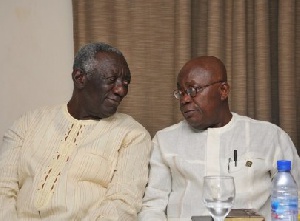The President’s Special Initiatives introduced by former President John Kufuor were “laudable”, three-time Flag-bearer of the main opposition New Patriotic Party, Nana Akufo-Addo has said.
“We have to look again at the bold attempt made in the Kufuor era to promote the diversification of our agriculture by the President’s Special Initiatives, which concentrated on industrial starch (i.e. cassava), oil palm and industrial salt,” Akufo-Addo urged.
“To these, were also added garments and textiles. They were laudable initiatives,” he said at the second Aliu Mahama memorial lecture at the Banquet Hall in Accra.
President Kufuor in 2005 created the PSIs as part of efforts to diversify Ghana’s economy be lessening its heavy reliance on cocoa as the major foreign exchange earning export commodity.
The programme was overseen by the Minister of Trade and Industry at the time, Alan Kyerematen, who has since contested and failed three times, to become flag-bearer of the NPP.
Only the starch component of the PSIs survived, albeit on a tottering scale.
The cultivation of Oil palm – which is said to have a bigger potential than industrial starch, was increased to about 100 hectares under the programme, but some of the Initiatives were discontinued after the NPP lost power in 2008.
Kyerematen recently said Ghana could have earned not less than $10 billion from the PSI on oil palm alone, if the current administration had continued with the programme.
In Akufo-Addo’s estimation, the PSIs were one of the ways by which the country could infuse some verve into the economy.
He said: “To make that breakthrough in our economy, we need to do more than fight corruption and manage our economy competently.”
“We need to think big and we need to grow our economy. Fighting corruption and managing our economy competently will save us a lot of money to fund many of the things we need to do. But if we are truly to transform our economy to meet the needs of our population and project us into the 21st century, we have no choice but to industrialise our economy and modernise its agriculture,” Akufo-Addo said.
For him, “agriculture is obviously an area with the most urgent need for attention.”
“Throughout the ages, most nations have started their industrialisation process through the modernisation and diversification of agriculture. Our farmers are still depending on the rudimentary instruments that other nations now place in their museums. It is not likely that we can hope to feed ourselves when the farming methods are still rooted in the nineteenth century,” he observed.
General News of Wednesday, 10 December 2014
Source: starrfmonline.com













